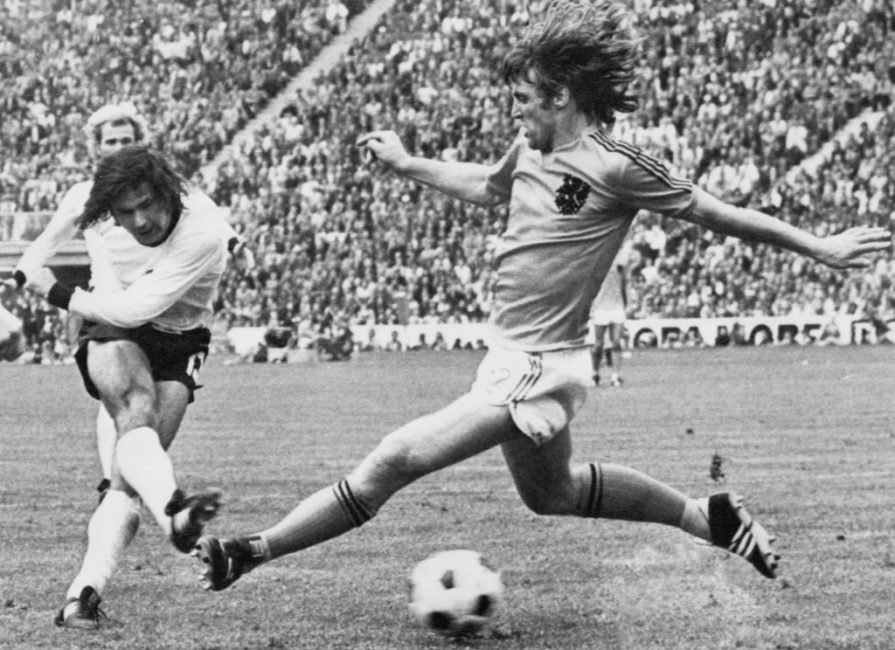Miasanrot Awards: 1st Place
1st place: Gerd Müller
by Lukas Tank
Anyone wanting to list Gerd Müller’s personal records could fill pages. Anyone wanting to cut together footage of only his important goals could create an epic saga. Anyone wanting to count his trophies wouldn’t even manage it with three hands.
“Little, fat Müller”, as his discoverer Čajkovski called him fondly, was unquestionably the best striker in German history and the history of FC Bayern Munich, in spite of all the resounding names.
For better classification, we asked football historian Lukas Tank for his opinion on the “nation’s bomber”:
What does a player have to do in order to count among the absolute greats in his position?
Firstly, he can’t be a one-hit wonder. A surprising number of players are able to give fantastic performances in individual isolated moments. When one or two of those moments also come in particularly important games, then suddenly a rather more mediocre player becomes an “illusionary giant”. True class is shown when somebody is able to conjure up top performances over many seasons. As the old cliché goes, class is permanent.
Secondly, he must not only be consistently very good, but also set new standards at times. The best footballers of all managed not only to achieve the category of “world class” in their careers, but also to even push the barrier for a time. Here one thinks of Maradona at the 1986 World Cup, or Messi… over the last 10 years!
Now, which German player can be said to fill both criteria? Beckenbauer, yes. Matthäus, probably. Walter, hard to say. Lahm and Neuer perhaps recently. Two or three others can be debated.
Alongside Beckenbauer, however, there is one more player for whom the answer can only be a “Yes!” yelled like a pistol shot: Gerd Müller, the best central striker in German football history.
A lot has already been written about Gerd Müller’s qualities. Most of it refers to – well duh – his unique ability to score from any scraps fed him. Müller was a penalty area genius; ingenious at engineering space for himself where there actually wasn’t any. His goal in the World Cup final is a good example of that.
In Ruud Krol, one of the best defenders of the 70s is on his toes; prepared to prevent any forward movement. Yet Müller doesn’t move forward, but into the small space that opens up behind him. There he finds just enough time and space to shoot through Krol’s legs. One can hardly reproach the Dutch defender here. Even after Müller’s ingenious move backwards, there’s barely more than a metre between the two at any time. But Müller controls that intensive opposition pressure inimitably.
I can only recommend that every reader take a look at the linked video in full. After just minutes you already get a feeling for what is meant by a “true Müller goal”.
His supernaturally quick perception, his nimble and simultaneously robust movement and his creativity in manoeuvring limbs allowed him to consistently resolve completely chaotic situations to his advantage. As someone who has looked a bit through football history, I have never seen the likes of it again. There’s only one who can do it: der Bomber!
In addition to that, there is, however, another narrative about Gerd Müller that I don’t want to miss out here. It concurs immediately that Müller was in fact an insanely good striker in the classical sense, but also adds: But not just that! The Bomber could do much more than “just” bomb. He often dropped back into midfield, combined freely, smartly, and equally with such fine players as Franz Beckenbauer and also defended as energetically and efficiently as if he had trained under Jürgen Klopp for years. Even the term “false nine” as a description for Müller can at least be considered. A wonderful example for this “other Müller” is this goal from the same video. That is, if I may, more Lionel Messi than Sandro Wagner!
The two narratives do not contradict one another and are both true. Gerd Müller was the ultimate penalty-box striker AND more than that. Both together make him, in my view, a top 10 candidate in a “best players of all time” ranking.

(Image: STAFF/AFP/Getty Images)
To conclude, just one more thing. Evaluating historical players is a difficult story; even more difficult than in the case of contemporary pros. There are several reasons for that. The most important, however, is certainly the lack of footage. It goes for players like Lahm or Schweinsteiger that many of us have followed their whole careers. Game for game for game we sat in front of the television and were able to observe their every action. And if you ever missed a game: it’ll be archived online somewhere. The same does not go for players of previous times. Even then, hardly anyone would have seen more than 50% of Bayern games in the 70s. If you didn’t live in Munich or the surrounding area, the rate sank quickly into single figures. Many important games have indeed stood the test of time and can be still seen today, but the bread and butter games from the day-to-day of the league are mostly lost forever. Was a Franz Beckenbauer really good week in week out? Today that can hardly be evaluated objectively. The same goes for almost all other players from that time.
I say “almost” because one kind of player is, at least half, an exception: those players who were primarily responsible for scoring goals. The statistic with which we measure their performances has ultimately been passed on entirely. We know who scored when against whom.
Now we’ve just heard that Gerd Müller did more than just score goals. At the same time, however, it is still of course true that goals are what he’s measured by. And because that’s the case, we can make much more precise statements about Müller’s performances than about most other players. Did Müller consistently deliver outside of the games that we can still see today too?
An answer in number form:
28, 19, 30, 38, 22, 40, 36, 30, 23, 23, 28, 24
That’s a good Bundesliga decade in Müller goals. 1966-67 to 1977-78. If you knew nothing else about Gerd Müller, if you’d not seen a second of him, these figures alone prove that he fills both criteria mentioned at the beginning: world class for many years, going even further at times. Gerd Müller, one of the best (Bayern) players of all time.









